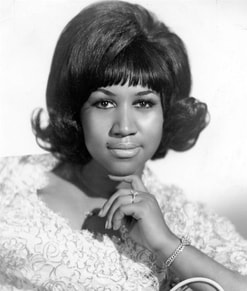Tribute to Aretha Franklin
1976: Sparkle

It seems as though every major musician has a dry spell, a wilderness period followed by a sudden surprise and a return to center stage, adulation, and wealth. The spark for Frank Sinatra was his Oscar-winning role in From Here to Eternity and his critically acclaimed albums Swing Easy and In the Wee Still Hours of the Morning.
For Peggy Lee, it was her surprise hit single “Fever.” For Duke Ellington, it was a riotous performance at the Newport Jazz Festival that made the cover of Time magazine. And for Aretha Franklin, it was the launch of her aptly named Sparkle LP. Miss Franklin spent her early recording years (1960–1967) at Columbia Records, where she released a total of ten overproduced albums, none of which made much of a splash.[1]
When Aretha switched to Atlantic Records in 1967, becoming her own gospel/R&B self at the piano in the studio, the floodgates opened to a six-year rush of R&B, pop, and gospel hits—“I Never Loved a Man,” “Respect,” “Baby I Love You,” “A Natural Woman,” “Chain of Fools,” “Since You’ve Been Gone,” “Think,” and others—racking up believe-it-or-not chart stats: 18 Top 3 R&B singles, 13 Top 10 pop, with 13 certified gold. Album sales lagged behind, but five were certified gold.[2] It was during this period she was crowned the Queen of Soul, capping her historic run in 1972 with Amazing Grace, a pure gospel two-LP set many believe is her greatest work, certainly her biggest-selling album that eventually certified double platinum. But then a swoon. Her next four albums yielded no hit singles, and debilitating doubts began to set in. What had worked for six years wasn’t working anymore. Both the superstar singer and her steady Atlantic producer, Jerry Wexler, knew they needed help but didn’t know where to turn.[3] A lucky break or two would be needed. Turns out it took two. Simultaneously. The long sought hit was originally promised to Aretha’s sister Carolyn, a singer like the Queen, though not as well known, but ambitious with RCA LPs to her credit. One day in Chicago, Carolyn accidentally bumped into rising superstar Curtis Mayfield, he of the recent mega hits “People Get Ready” and “Keep on Pushing” and the score for the acclaimed Superfly movie. Curtis told her he was working on another score for a film about three sisters who start out in church and wind up singing R&B. In addition to writing the soundtrack, he was producing an album of the score in his own studio and wanted an experienced R&B vocalist to cut the album. Was she interested? “Yes” was the first word out of her mouth.[4] At the same time, Aretha Franklin dispensed her manager (brother Cecil) and her booking agent to meet with Atlantic Records owner Ahmet Ertegun and let him know that she had dumped Wexler and needed another producer. Ahmet suggested Curtis Mayfield. The pair took his idea to Aretha, she smiled, and brother Cecil called Curtis. That’s when he learned Sparkle had been promised to sister Carolyn. Knowing the Queen could do more to popularize his songs, Curtis sent her Sparkle, and she let it be known she wanted it in the worst possible way. A nasty verbal catfight ensued, and the sister feud was turned over to Reverend C. L. Franklin. He heard both sides. Carolyn argued that she was there first and needed hits more than her sister did. Aretha argued that Curtis preferred her, and given her long dry spell, she also needed hits. To no one’s surprise, the reverend came down on Aretha’s side.[5] When the record broke open for Aretha, the critics and the public both loved it. Biographer David Ritz gushed, “Sparkle sparkles like nothing Aretha had done before or since . . . arguably her most impassioned secular singing. From start to finish her collaboration with Curtis Mayfield is a triumph of kindred spirits.”[6] Many of the singer’s previous albums were a grab bag of originals and covers or, as Jerry Wexler put it, “They aren’t albums at all. They’re compilations of singles”—in other words, not concept albums. Yet, this recent collaboration with Mayfield spawned three near-hit singles and one bona fide single—“Something He Can Feel”—that held the number one spot on the R&B charts for nineteen weeks. The album itself peaked at number one on the R&B chart and eighteen on the pop chart and certified gold. Booking agent Ruth Bowen summed it up best, “After being lost in the woods for a couple of years, she found her way out.”[7] As for the family blood feud, sisterhood prevailed. Wounds healed. In any case, none of this would have happened had Carolyn not bumped into Curtis Mayfield on a windy Chicago day and had Aretha not dumped long-term producer Jerry Wexler. Sparkle would seal her comeback, but as the fates would have it, she faced another drought during the age of disco. She came back again with a switch to Arista Records to revive her career anew with a string of hits in the eighties—“Jump to It,” “Get It Right,” “Freeway of Love,” “Who’s Zoomin’ Who,” and “I Knew You Were Waiting.” She faced another slump in the nineties. Yet by decade’s end, she was on the charts once again.[8] Persistence matters. CODA The Soul Queen garnered more accolades, awards, and honors than almost any other American entertainer. In 1979 she received a star on the Hollywood Walk of Fame, a mere harbinger of splendid things to come. Aretha tallied 15 gold singles, second best for a female artist, 10 gold and four platinum albums, and a double-platinum (Amazing Grace).[9] She had 23 number one R&B hits, more than anyone in US history. Overall, she logged 96 R&B chart entries, second only to James Brown (118) and 52 Top 10 pop hits, just below Louis Jordan (54) and James Brown (58). And she achieved the largest Top 100 chart span—over fifty-three years—for any female artist. Longevity matters.[10] She collected eight Grammys in the best R&B vocal category, second only to Janet Jackson. The Grammy organization honored her with a Lifetime Achievement Award in 1994.[11] The Queen of Soul transcended the R&B category. VH1 listed her first among the one hundred greatest women in rock and roll compiled in 1999. She was the first female inducted into the Rock and Roll Hall of Fame, and Rolling Stone magazine named her first in its 100 greatest singers of the rock era, male or female, compiled in 2008.[12] National recognition was bestowed on the Queen as well. Aretha sang the National Anthem at the 1992 Democratic National Convention and “My Country ’Tis of Thee” at Barack Obama’s 2009 inauguration. She received the Kennedy Center Honors Award in 1994, the National Medal of the Arts from President Clinton in 1999, and the Medal of Freedom from President Bush in 2005. Time magazine named Aretha one of the most influential entertainers of the 20th century.[13] R-E-S-P-E-C-T. CODA CODA Unlike the album, Sparkle the movie, also released in 1976, did not catch on with the critics or the public. Praise was reserved for Curtis Mayfield’s songs, however. The film’s problems lie elsewhere. A 2012 remake fared better with the critics, receiving mixed to positive reviews. The remake featured songs from the original as well as new compositions by R. Kelly. Bottom line: if you need to add a sparkle to your life, the Soul Queen’s album is all you’ll need.
|
In memoriam, a short piece on Aretha Franklin, covering her rise to prominence when she switched to Atlantic Records in 1967 and her recovery from her mid-career slump in 1977. Excerpted from Serendipity Doo-Doh, Book One.
|
